|
|
|
Sort Order |
|
|
|
Items / Page
|
|
|
|
|
|
|
| Srl | Item |
| 1 |
ID:
120283
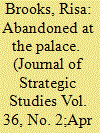

|
|
|
| 2 |
ID:
121522
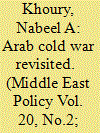

|
|
|
| 3 |
ID:
141282
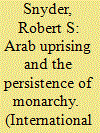

|
|
|
|
|
| Summary/Abstract |
The Arab uprising that began in 2010 saw the fall of rulers in states that had republican governments, yet the monarchs in their states survived. This is ironic in light of the fact that many monarchs throughout history have been vulnerable to revolutions. What explains this discrepancy? Although the literature has emphasized the impact of petrodollars in preserving the rule of the monarchs, this article stresses ideological and institutional factors. Like the Soviet Union's embrace of Marxism–Leninism, the Arab republics had regimes based on the failed ideology of revolutionary nationalism. Although revolutionary nationalism, which fused the nation and state, declined by the late 1960s, it left an institutional legacy that made it difficult for the republican states to change. On the contrary, in defining themselves in opposition to revolutionary nationalism, the monarchs provided for security and stability in making themselves somewhat immune to transnational revolutionary movements like the Arab uprising. In differentiating the state from the nation, the monarchs, paradoxically, showed more respect for different societal interests within the nation than the republican rulers.
|
|
|
|
|
|
|
|
|
|
|
|
|
|
|
|
| 4 |
ID:
139254
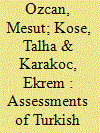

|
|
|
|
|
| Summary/Abstract |
Using original public-opinion polls and elite interviews conducted in 2012, this article analyzes the perceptions of Turkish foreign policy regarding the Arab Uprisings and the Syrian conflict in three Middle Eastern countries, Egypt, Iraq and Iran. It finds that ethnic, sectarian and religious groups in these three countries vary significantly in their views on Turkish foreign policy regarding both the Arab Uprisings and the Syrian conflict, although the same identity-related factors have a less salient effect at the elite level. The findings also suggest that the intersection of ethnicity and sect shapes people's attitudes toward Turkish foreign policy in Iran and Iraq. Sunnis, except for Kurds in Iran and Iraq, tend to have a positive view of Turkish foreign policy, while Shia Turkomans in Iraq tend to have a negative one.
|
|
|
|
|
|
|
|
|
|
|
|
|
|
|
|
| 5 |
ID:
121071
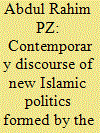

|
|
|
|
|
| Publication |
2013.
|
| Summary/Abstract |
The 2011 popular Arab uprising in West Asia and North Africa has been totally changed the existing perceptions and opinions on the Arabs. Arab uprisings were happened because of the three main deficits. They were economic, political and dignity deficits respectively. Political Islam, Islamist Movements, and new Islamic politics were also discussed rather than before. The political thoughts of classical Islamist Intellectuals like Sayyid Qutub, Hasan al Banna and Abul A'ala Moududi have been modified as per the new Islamic political thoughts of Rashid Al Gannouchi and the practical models of Racep Tayyib Erdogan. Definitions of the Europian secularism and democracy changed.
|
|
|
|
|
|
|
|
|
|
|
|
|
|
|
|
| 6 |
ID:
184942
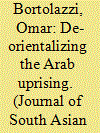

|
|
|
| 7 |
ID:
180041
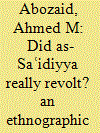

|
|
|
|
|
| Summary/Abstract |
The purpose of this study is to investigate and inspect the causes that prevented the (marginalised and isolated) society of Saʿid from rebelling against President Mubarak’s authoritarian regime, as the North did. Here I seek to present different interpretation of as-Saʿidiyya’s attitudes toward the 2011 uprising away from the Manichean ‘glorification’ versus ‘ignominy’, or ‘celebrating’ v. ‘contempt’ narrative that dominated the study of the Saʿid and as-Saʿidiyya role in the 2011 Arab uprising. My research is based on interviews, participant observation and ethnographic investigation which articulates the behaviour of peasants as political actors in this time of turmoil, While most sociological and anthropological studies of revolutions concentrate on cities and urban areas, this article focuses on a small town, Madinat Al-Fikriyya, and village, Munshaʿiat Al-Fikriyya in Al-Minya governate in Upper Egypt. Therefore, to understand the role of as-Saʿidiyya in the 2011 uprising, the article suggests three conceptual changes to this convention. Firstly, by putting peasantry communities within socio-political and socio-economic contexts; secondly by concentrating on understanding the dynamics of state-society relations, and lastly, exploring the role of security establishment and levels of penetration into the society in order.
|
|
|
|
|
|
|
|
|
|
|
|
|
|
|
|
| 8 |
ID:
126680
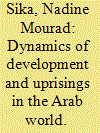

|
|
|
|
|
| Publication |
2013.
|
| Summary/Abstract |
This essay examines the structural economic reform measures undertaken in the Arab world in the past two decades. Developmental projects in the region have attained growth in gross domestic product, higher levels of human capital, and stable governments. These, however, have been accompanied by corruption, structural economic problems, social exclusion, and negligence of good governance and the rule of law. This essay suggests that the juxtaposition of economic reform and liberalization with corruption, authoritarianism, and absence of good governance were a recipe for the social tumult that became the Arab Spring. Social unrest will remain the rule rather than the exception in the Arab region for the foreseeable future, especially in countries that have undergone regime change, such as Egypt and Tunisia, due to the lack of expected economic and political reforms.
|
|
|
|
|
|
|
|
|
|
|
|
|
|
|
|
| 9 |
ID:
119926
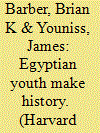

|
|
|
|
|
| Publication |
2012.
|
| Summary/Abstract |
Thirty years of research have identified common facets of social movements (i.e. grievances, resources, ideology, and opportunity) that challenge and change government systems. An example was the 1989 demise of the Soviet socialist bloc in Eastern Europe, which is described in Oberschall's 2000 article "Social Movements and the Transition to Democracy" and in Opp & Gern's 1993 study, "Dissident Groups, Personal Networks, and Spontaneous Cooperation: The East German Revolution of 1989." Once again we are witnessing a region-wide upheaval, this time in the Middle East as the Arab uprisings that began in Tunisia continue to ripple across national boundaries. It is too early to say with certainty how or why this cascade started, much less tell where it is headed. However, some basic facts make the situation worth inspecting carefully, especially since youth have been on the forefront of numerous movements throughout history. This has surely been the case in the contemporary Middle East.
|
|
|
|
|
|
|
|
|
|
|
|
|
|
|
|
| 10 |
ID:
130940
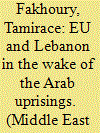

|
|
|
|
|
| Publication |
2014.
|
| Summary/Abstract |
Lebanon is a multisectarian state in which Muslim and Christian groups share political power. The executive elite is composed of a Maronite president, a Shiite speaker of parliament and a Sunni prime minister. The legislature is split 50-50 between Muslims and Christians, and communities enjoy educational and religious autonomy. Two pacts act as regulatory frameworks for these political arrangements: the 1943 National Pact and the 1989 Taif agreement, which put a halt to Lebanon's 15-year civil war (1975-90).
While Lebanon's prewar political system (1943-75) was often framed as a paradigmatic case of consociational or power-sharing democracy,1 most observers today agree that this system is an anarchistic model for the devolution of power. 2 Sectarian3 politics feeds on patronage ties and foreign alliances through which communities vie for control over resources. It further reifies partisanship in external conflicts.
|
|
|
|
|
|
|
|
|
|
|
|
|
|
|
|
| 11 |
ID:
133597
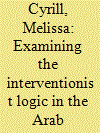

|
|
|
|
|
| Publication |
2014.
|
| Summary/Abstract |
At first glance, there was no coherent regional and international response to the transitions triggered in the Arab world since December 2010 as external players, both regional and international, had to confront with unceasing alarm the rapidity of change threatening to unravel in critical Arab states. However, as events in the region progressed, a pattern emerged to the external responses, one that was as predictive as it was differentiated. This was exemplified by the counter-revolutionary forces that were assembled against the transition in Bahrain on one hand, and the aggressively interventionist posture adopted towards Libya and Syria on the other. This inconsistency between activism and support for the supposedly democratic spirit of armed resistance groups, but inaction and silence towards the crushed non-violent public opposition elsewhere, clearly betrayed the interest-driven motivations of the external actors involved.
|
|
|
|
|
|
|
|
|
|
|
|
|
|
|
|
| 12 |
ID:
132979
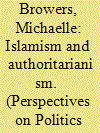

|
|
|
|
|
| Publication |
2014.
|
| Summary/Abstract |
Based on the texts of the five works under review here and what we know about the pace of academic publishing, it is clear that the bulk of the analysis provided in each was written prior to the waves of demonstrations and protests that swept the Arab region beginning in December 2010. One can only imagine how many scholars of Arab politics with books in process were faced with the dilemma of whether a chance to revisit the text was worth delaying publication or mourning the passing of the opportunity to make that decision. The authors of three of the works under review were able to incorporate some analysis of events that were only unfolding as the texts went to press, in prefaces, introductions, conclusions, and codas. The two authors who did not have or take the opportunity to reference the uprisings are no poorer as a result. For the most part, each of these books contributes something important to our understanding of the recent political upheavals and changes that continue to unfold.
|
|
|
|
|
|
|
|
|
|
|
|
|
|
|
|
| 13 |
ID:
133628
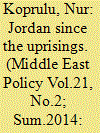

|
|
|
|
|
| Publication |
2014.
|
| Summary/Abstract |
The Islamist movement - in particular the Muslim Brotherhood - has begun to be seen as one of the main beneficiaries of the uprisings in the post-2011 Middle East. The Islamist group's support for public rallies (especially in Egypt, Tunisia and Syria) epitomizes a new era of challenge for the incumbent Arab regimes. Although it is too early to speak of structural change or a revolutionary era in the region, the events of the Arab Spring have highlighted the profound effect the Muslim Brotherhood Society (Jamaat al-Ikhwan al Muslimin) is having in most Middle Eastern countries.
|
|
|
|
|
|
|
|
|
|
|
|
|
|
|
|
| 14 |
ID:
124615
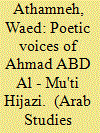

|
|
|
|
|
| Publication |
2013.
|
| Summary/Abstract |
This article examines the poetic voices of Egyptian poet Ahmad Abd al-Mu'ti Hijazi in five representative poems written between 1950 and 2011. It investigates the role of major political events in the Arab world on his trajectory and poetic voice. The article argues that Hijazi changes his poetic voice in relation to the status quo in Egypt. The article concludes that these voices conflict and clash with one another. Hijazi publishes a collection of poetry after the eruption of the Egyptian Revolution in January 2011, to inspire his people, protest against Mubarak's regime, and regain his poetic voice.
|
|
|
|
|
|
|
|
|
|
|
|
|
|
|
|
| 15 |
ID:
173865
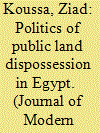

|
|
|
|
|
| Summary/Abstract |
This article examines changes in the allocation of urban land in Egypt between 1975–2011 with the rise and incorporation of state authoritarianism and neoliberal economics in what I call ‘authoritarian neoliberalism’. Authoritarian neoliberalism in Egypt transferred ownership of urban lands from public wealth to an affluent class of local and foreign capitalists – often in a non-transparent fashion. The article focuses on the government's legally sanctioned practices of subsidisations, privatisations and evictions as they relate to what I call, inspired by David Harvey's formulation, the accumulation of wealth by dispossession. Dispossession of public urban land, I maintain, generated widespread resentment that played a vital, but inadequately discussed, role in the series of revolts that culminated in the 2011 uprising in Egypt. Social tensions engendered in this authoritarian neoliberal regime, I argue, endure under the administration of President Abdel Fattah el-Sisi, who continues to transfer public urban lands, from lower to higher socioeconomic classes, at an even faster pace than his predecessor.
|
|
|
|
|
|
|
|
|
|
|
|
|
|
|
|
| 16 |
ID:
138045
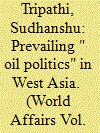

|
|
|
|
|
| Summary/Abstract |
West Asia is currently in the midst of tumultuous changes due to atypical forces that have compelled member-states to maintain alliances with the major powers.
|
|
|
|
|
|
|
|
|
|
|
|
|
|
|
|
|
|
|
|
|